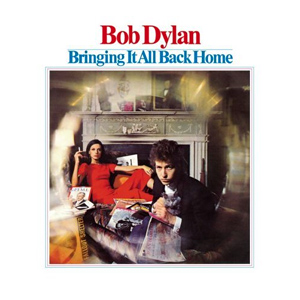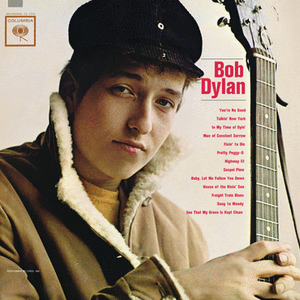Related Research Articles

Highway 61 Revisited is the sixth studio album by American singer-songwriter Bob Dylan, released on August 30, 1965, by Columbia Records. Having until then recorded mostly acoustic music, Dylan used rock musicians as his backing band on every track of the album, except for the closing track, the 11-minute ballad "Desolation Row". Critics have focused on the innovative way Dylan combined driving, blues-based music with the subtlety of poetry to create songs that captured the political and cultural chaos of contemporary America. Author Michael Gray has argued that, in an important sense, the 1960s "started" with this album.

Bringing It All Back Home is the fifth studio album by American singer-songwriter Bob Dylan. It was released on March 22, 1965, by Columbia Records.

Bob Dylan is the eponymous debut studio album by American singer-songwriter Bob Dylan, released on March 19, 1962 by Columbia Records. The album was produced by Columbia talent scout John H. Hammond, who had earlier signed Dylan to the label, a decision which was at the time controversial. The album primarily features folk standards, but also includes two original compositions, "Talkin' New York" and "Song to Woody". The latter was an ode to Woody Guthrie, a major influence in Dylan's early career.

Roy Claxton Acuff was an American country music singer, fiddler, and promoter. Known as the "King of Country Music", Acuff is often credited with moving the genre from its early string band and "hoedown" format to the singer-based format that helped make it internationally successful. In 1952, Hank Williams told Ralph Gleason, "He's the biggest singer this music ever knew. You booked him and you didn't worry about crowds. For drawing power in the South, it was Roy Acuff, then God."

"The Great Rock Island Route", popularized as "Wabash Cannonball" and various other titles, is a 19th century American folk song that describes the scenic beauty and predicaments of a fictional train, the Wabash Cannonball Express, as it traveled on the Great Rock Island Railroad. The song has become a country music staple and common marching band repertoire. The only train to actually bear the name was created in response to the song's popularity, with the Wabash Railroad renaming its daytime express service between Detroit and St. Louis as the Wabash Cannon Ball from 1949 until discontinuation during the formation of Amtrak in 1971.
Benny Edward Martin, was an American bluegrass fiddler who invented the eight-string fiddle. Throughout his musical career he performed with artists such as the Bluegrass Boys, Don Reno, the Smoky Mountain Boys and Flatt and Scruggs, and later performed and recorded with the Stanley Brothers, Hylo Brown, Jimmy Martin, Johnnie and Jack, and the Stonemans, among others. He was inducted into the International Bluegrass Music Hall of Fame in 2005.
Donald W. Gant was an American singer, songwriter and record producer.
"Man of Constant Sorrow" is a traditional American folk song first published by Dick Burnett, a partially blind fiddler from Kentucky. The song was originally titled "Farewell Song" in a songbook by Burnett dated to around 1913. A version recorded by Emry Arthur in 1928 gave the song its current titles.

"Just Like Tom Thumb's Blues" is a song written and performed by Bob Dylan. It was originally recorded on August 2, 1965, and released on the album Highway 61 Revisited. The song was later released on the compilation album Bob Dylan's Greatest Hits Vol. II and as two separate live versions recorded at concerts in 1966: the first of which appeared on the B-side of Dylan's "I Want You" single, with the second being released on The Bootleg Series Vol. 4: Bob Dylan Live 1966, The "Royal Albert Hall" Concert. The song has been covered by many artists, including Gordon Lightfoot, Nina Simone, Barry McGuire, Judy Collins, Frankie Miller, Linda Ronstadt, the Grateful Dead, Neil Young, The Black Crowes, Townes Van Zandt, and Bryan Ferry. Lightfoot's version was recorded only weeks after Dylan's original had been released and reached #3 on the Canadian RPM singles chart.

"I Saw the Light" is a country gospel song written by Hank Williams. Williams was inspired to write the song while returning from a concert by a remark his mother made while they were arriving in Montgomery, Alabama. He recorded the song during his first session for MGM Records, and released in September 1948. Williams' version did not enjoy major success during its initial release, but eventually it became one of his most popular songs and the closing number for his live shows. It was soon covered by other acts, and has become a country gospel standard.

"Mother Earth" is a blues song recorded by Memphis Slim in 1951. A slow twelve-bar blues, it is one of Slim's best-known songs and reached number seven in the Billboard R&B chart in 1951.
"Talkin' New York" is the second song on Bob Dylan's eponymous first album, released in 1962. A talking blues, the song describes his feelings on arriving in New York City from Minnesota, his time playing coffee houses in Greenwich Village, and his life as a folksinger without a record deal. The lyrics express the apparent difficulty he had finding gigs as a result of his unique sound, with a character in the song telling Dylan: "You sound like a hillbilly; We want folk singers here."
"Honey, Just Allow Me One More Chance" is a song recorded by blues musician Henry "Ragtime Texas" Thomas in 1927, under the title "Honey, Won't You Allow Me One More Chance". It was covered by Bob Dylan on his album The Freewheelin' Bob Dylan, which came out on May 27, 1963.
"It Takes a Lot to Laugh, It Takes a Train to Cry" is a song written by Bob Dylan, that was originally released on his album Highway 61 Revisited. It was recorded on July 29, 1965. The song was also included on an early, European Dylan compilation album entitled Bob Dylan's Greatest Hits 2.
"To Be Alone with You" is a country-rock song by American singer-songwriter Bob Dylan, released as the third track on his 1969 album Nashville Skyline.

A Tribute to Roy Acuff: The King of Country Music is a studio album by American country artist Hank Locklin. It was released in February 1962 via RCA Victor Records. It was co-was produced by Chet Atkins and Anita Kerr. The project was a tribute record to fellow country artist and Grand Ole Opry member Roy Acuff. It featured a collection of 12 songs recorded famously by Acuff up to that point in his own career. The album received positive reviews and reception from critics following its release.
"Dear Landlord" is a song by American singer-songwriter Bob Dylan. It was recorded on November 29, 1967, at Columbia Recording Studios, Nashville, produced by Bob Johnston. The song was released on Dylan's album John Wesley Harding on December 27, 1967. It is a piano blues that has been interpeted as an address to his then-manager Albert Grossman.
"You're No Good" is a song by Jesse Fuller that appeared as the first track on Bob Dylan's eponymous debut album, released on November 20, 1961. Dylan learnt the song directly from Fuller in Denver; Fuller's own recorded version was not released until May 13, 1963, on his album San Francisco Bay Blues. The song concerns the narrator's difficult relationship with a woman, and concludes with the narrator wanting to "lay down and die". Dylans version is more uptempo than Fuller's, and has some changes to the lyrics. Bob Dylan received a generally negative critical reception on release, although some later critics have praised the album and its opening track.
"Highway 51 Blues" is a song composed by American blues pianist Curtis Jones, released on a 78 record on January 12, 1938. Bob Dylan's track "Highway 51", released as the closing track of his debut album Bob Dylan on March 19, 1962, incorporated the tune from Jones's version.
References
- 1 2 3 Russell 2004, p. 351.
- ↑ Chadbourne, Eugene. "John Lair –Biography". AllMusic . Retrieved January 9, 2022.
- 1 2 3 4 5 6 7 Margotin & Guesdon 2015, "Freight Train Blues" section.
- ↑ Harkins 2004, pp. 82–83.
- ↑ "Old Shep: The Red Foley Recordings 1933–1950 –Overview". AllMusic . Retrieved January 8, 2022.
- ↑ Cohen 2000, p. 525.
- 1 2 Wolfe 2015, Chapter 16.
- 1 2 Cohen 2000, pp. 525–526.
- 1 2 3 4 Sullivan 2013, p. 67.
- ↑ Russell 2004, p. 48.
- ↑ Cohen 2000, p. 526.
- ↑ Cohen 2000, p. 524–525.
- 1 2 Cohen 2000, p. 524.
- ↑ Schlappi 1997, p. 107.
- ↑ Erlewine, Stephen Thomas. "Roy Acuff: Greatest Hits [Columbia] –Review". AllMusic . Retrieved January 8, 2022.
- ↑ Jurek, Thom. "The Essential Roy Acuff: 1936–1949 –Review". AllMusic . Retrieved January 8, 2022.
- 1 2 Williams 1962, Back cover.
- 1 2 Starr 2021, eBook.
- ↑ Nogowski 2008, p. 15.
- ↑ Hales 2014, p. 258.
- ↑ Bob Dylan (Reissue album notes). Bob Dylan. New York City: Columbia Records. 1985. CD label. CK 94239.
{{cite AV media notes}}: CS1 maint: others in cite AV media (notes) (link) - ↑ Harvey 2001, p. 31.